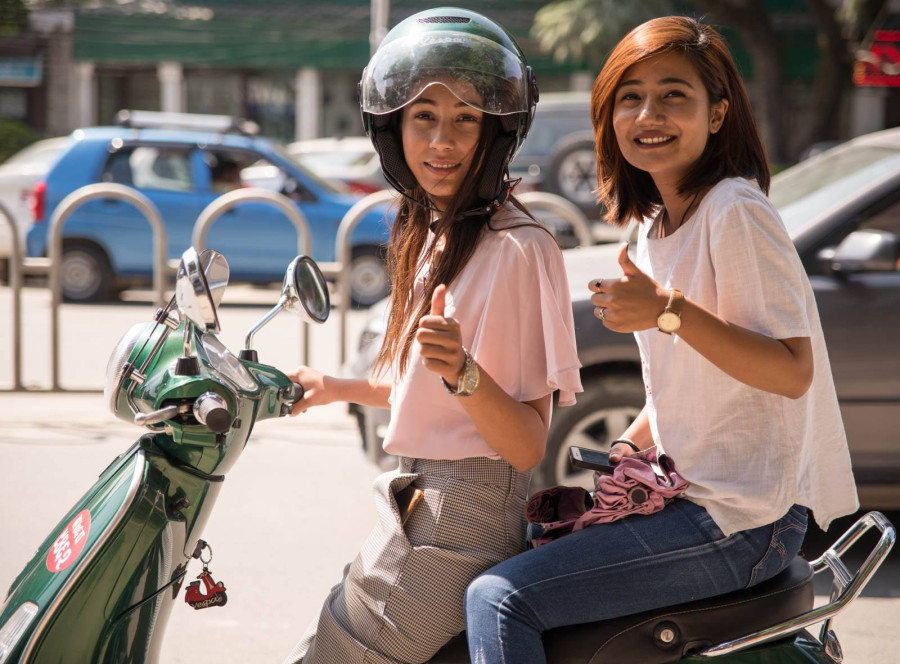Valley
Ride-sharing services ridden with issues—from safety and insurance to privacy compliance
The two companies operating ride-sharing services have come under scrutiny for a lack of regulations, concerns over tax filings, privacy and security compliance, and road safety and insurance.
Nayak Paudel
The popularity of ride-sharing services was a litmus test for the government when the Metropolitan Traffic Police Division, following complaints by the taxi drivers’ commission, enforced a crackdown in the Capital on January 14 and 15 and seized motorbikes used “illegally to offer transportation services”.
Two days later, Prime Minister KP Sharma Oli instructed Physical Infrastructure and Transport Minister Raghubir Mahaseth not to ban ride-sharing services.
Tootle and Pathao, two ride-sharing apps operating in Kathmandu Valley, have a user base of 450,000 clients and their downloads continue to soar. Combined, they have 26,500 registered riders or partners and on average, some 8,000 motorbike trips are made daily. Riders commit about five trips a day and make about Rs100 per trip.
For the riders and clients, ride-sharing apps have become an innovative deal, creating income opportunities, and for commuters, an effective alternative amid an infrastructural problem. But in recent weeks, companies operating these services have come under scrutiny for a lack of regulations, concerns over tax filings, privacy and security compliance, and road safety and insurance.
“Effective April 14, the new law will have provisions for ride-sharing and there will be directives to regulate the services,” Gokarna Prasad Upadhyaya, spokesperson for the Department of Transport Management, told the Post. “The apps which offer the ride-sharing services will have to run as transport operators.”
Representatives from both Tootle and Pathao, who have had meetings with the department authorities, say that their companies plan to diversify and object to just being limited as transport operators.
Tootle and Pathao have gained popularity among the youth, but the massive support both on social media it received following the crackdown quickly evaporated after an expose by Republica, a national daily, that revealed that Tootle had been charging its customers VAT for 19 months without government approval. Following the report, the Inland Revenue Department initiated an investigation.
“The department is investigating Tootle’s overall account. We will publicise our findings soon,” Yagya Prasad Dhungel, the department’s deputy director general, told the Post.
Officials at Tootle said they weren’t aware of the rules and regulations of VAT and have been working on a public statement. “We didn’t know that we had to pay the VAT charges to the government. We stopped charging VAT once we came to know about it,” Sixit Bhatta, the Tootle co-founder, told the Post. “We have cleared our taxes for the fiscal year 2016/17 and the crackdown started just as we were closing our books for 2017/18.”
Earlier, Tootle had also been deducting TDS (tax deducted at source) from January 2017 to July 2018.
“If the company has deducted the TDS from the fare itself, the rider is not liable to pay taxes to the government from their earning. Our investigation will be looking into this aspect as well,” Dhungel said.
At Pathao, officials say they are on the negative side of earnings and have already submitted their audit report to the revenue department. “We are promoting our services as of now. The little profit that we make is currently offered as a bonus to our riders,” Asheem Basnyat, the company’s regional director, told the Post.
On its website, Pathao says that a rider can earn up to Rs40,000 a month and Basnyat said his company doesn’t deduct TDS. “Clients pay the riders with cash and since there is no law that regulates ride-sharing, the riders are unaware of taxes,” he said.
Both Tootle and Pathao, however, charge 20 percent and 5 percent commission per trip from the riders respectively and charge about Rs25 per kilometre, which is subject to rush hours.
Kathmandu-based Hyperloop Private Limited, which owns Tootle, and investors from Bangladesh and the US, who operate Pathao, dictate stringent terms of use on their respective websites and apps. While both the startups declined to reveal who their investors are, the companies have been collecting vital documents, including citizenship details of riders, while screening them as riders.
“The data of citizenship or licence is kept by every company, including Ncell, which is an international company. We have also followed the ethics of keeping the data private and can assure it will not be misused,” said Bhatta of Tootle.
Ncell is required by law to collect citizenship cards, which in Nepal’s case are the most commonly used form of national ID.
Pathao had recently been accused of stealing user’s phone data in Bangladesh when a Dhaka-based system analyst demonstrated in a YouTube video how Pathao was stealing information and storing it in the server.
The status of both Tootle and Pathao’s data privacy and security compliance certification or standards are not documented on their websites or apps but both companies say the data is in safe hands.
“The data are stored in our system and even I don’t have access to it,” Basnyat said. “Only two staff in the data department have access and we get notification of what the one is doing with the data.”
Both companies insist that the collection of documents is to ensure that riders have good character and have taxes for their vehicles so the clients can enjoy a safe ride and benefit from third-party insurance in case of accidents. Officials at the ride-sharing companies also say people who have been booked for driving under the influence of alcohol are disqualified from becoming riders.
“Our system alerts us if a rider is exceeding the speed limits. Riders who violate the speed limit are called to our office and given a warning or suspended for a certain time,” Basnyat said.
Pathao, which offers 24-hour service, has a average speed of 15 km per hour during daytime and a 40 km per hour during the night. Tootle, which operates from 6am to 9pm, has not imposed any speed limit so far.
“We suspend the service after nine. The roads are empty and we don’t want to take any risks,” said Bhatta.
More than 60 percent of all accidents in Kathmandu Valley either involve motorcycles or scooters. According to data with the Metropolitan Traffic Division, of the 6,381 accidents registered in the Valley last year, 4,065 incidents involved two-wheelers.
Although Pathao plans to extend its services on four-wheelers, both ride-sharing apps offer motorbike rides as of now and rely on third-party insurance for both the rider and pillion but with stringent terms of the insurance policy, the coverage could be contested. Following the government crackdown earlier this month, both Tootle and Pathao, which claim to have been working on a blanket insurance policy, have been disqualified to do so.
As per the Transport Insurance Act-2073, a rider and a pillion of a private motorbike are provided with insurance coverage of Rs500,000 in case of death and Rs300,000 in case of an accident.
But the insurance does not compensate when the accident occurs due to the negligence of the rider. Similarly, a child less than one year old will receive 25 percent of the compensation amount, while a child between one and five years of age will be provided 50 percent of the policy amount in case of motorbikes.
In the case of public transport, such as buses, taxis and tempos, each individual is given Rs5 million in case of death as well as accident.
Pathao’s parent company in Bangladesh has blanket insurance for its riders and users. In Bangladesh, 100,000 takas—1 Bangaldeshi taka is 1.36 rupees—is provided for accidental death. The company provides 100,000 takas for permanent disability and 50,000 takas for hospitalisation.
“The insurance scheme in Bangladesh was adopted only after the government endorsed ‘Ride-sharing Service Guideline 2017’ for ride-sharing companies and made the service legal,” said Basnyat. “We have also approached different insurance companies but they have rejected us for now saying we are illegal.”




 14.24°C Kathmandu
14.24°C Kathmandu














